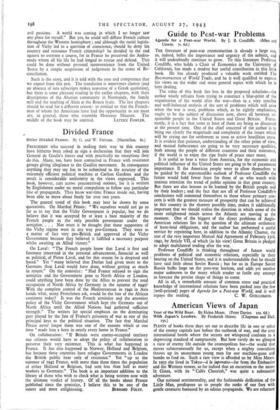Divided France
Hitler Divided France. By G. and W. Fortune. (Macmillan 6s.) FRENCHMEN who succeed in making their way to this country have hitherto been asked to sign a declaration that they will join General de Gaulle's forces and with practically no exceptions they do this. Many, too, have been connected in France with resistance groups giving allegiance to the Gaullist movement. In consequence anything they may say has to be submitted to the scrutiny of the extremely efficient political machine at Carlton Gardens, and the result is considerable uniformity in the views expressed. This book, however, cuts across preconceived notions, for it is written by Englishmen under no moral compulsion to follow any particular line of propaganda. They knaw war-time France inside out, having been able to move about freely for over two years.
The general trend of this book may best be shown by some quotations. On Marshal Petain: " We ourselves would not go so far as to say that the Vichy Government is popular, but we do believe that it was accepted by at least a bare majority of the French people as the only possible government under the armistice.. . . Nor must it be thought that these supporters of the Vichy regime were in any way pro-German. They were as a matter of fact very pro-British and approved of the Vichy Government because they believed it fulfilled a necessary purpose whilst awaiting an Allied victory."
On Laval: " The French people know that Laval is first and foremost interested in the personal advancement, financial as well as political, of Pierre Laval, and for this reason he is despised and hated." Yet " many believed that Darlan had given more to the Germans than Laval would have done, without getting as much in return." On the armistice: " Had France refused to sign the armistice and the Government gone to North Africa or London, could anything have been done by the Allies to prevent the total occupation of North Africa by Germany in the autumn of 1940? With the complete control of the Mediterranean in 1940 in Axis hands what, many Frenchmen ask, would be the fate of the African continent today? It was the French armistice and the attentiste policy of the Vichy Government which kept the Germans out of North Africa until the Allied Nations had gathered sufficient strength." The writers lay special emphasis on the dominating part played by the fate of France's prisoners of war as one of the principal keys to the political situation. The fact that Marshal Petain never forgot them was one of the reasons which at one time " made him a hero in nearly every home in France."
On collaboration: " If Britain were enemy-occupied territory our citizens would have to adopt the policy of collaboration to preserve their very existence. This is what has happened in France. It has also happened in Norway, Holland and Belgium, but because these countries have refugee Governments in London the British public hear only of resistance." Yet "up to the summer of 1942 France, with more than three times the population of either Holland or Belgium, had sent less than half as many workers to Germany." The book is an important addition to the library of those who wish to check what is being written now with
the ultimate verdict of history. Of all the books about France published since the armistice, I believe this to be one of the






















 Previous page
Previous page